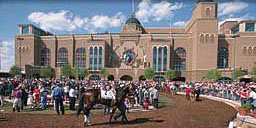|

|
 |
Two Horses at Lone Star Park Test Postitive
for Equine Piroplasmosis - Trainers Bret Calhoun, Kevin Favre and Brian
House Horses To Be Quarantined (Grand Prairie, Texas - June 4, 2010) - Two horses on the Lone Star Park backstretch have tested positive for Equine Piroplasmosis, which is a tick-borne disease caused by parasites that affects horses, donkeys, mules and zebras. In addition, a third horse, who has left Lone Star Park and been shipped to New Mexico, also tested positive for the disease. Seven Shooter, one of the two infected horses at Lone Star Park, is trained by 2010 leading trainer Bret Calhoun, while the other, Street Positioning, is trained by Kevin Favre. Brian House trains the horse that left for New Mexico. As a result, horses in Calhoun’s D1 barn, as well as Favre’s and House’s horses in Barn B6, have been restricted from racing and training with other horses by the Texas Animal Health Commission (TAHC), whose representative Bobby Crozier is on the grounds at Lone Star Park. “Right now, we are cooperating fully with the efforts of both the Texas Animal Health Commission and the Texas Racing Commission,” said Lone Star Park President and General Manager Drew Shubeck. “We are following the direction of Bobby Crozier from the TAHC, who has instructed us to place restrictions on the horses of the affected trainers. We will continue to work with the TAHC and Dr. Ken Quirk, the chief veterinarian for the Texas Racing Commission, to resolve this issue as quickly as possible. “While we work toward resolution of the problem, we don’t anticipate any disruption in our racing schedule, which runs through July 18,” added Shubeck. “We are also in discussions to make some adjustments in our daily training schedule to allow the quarantined horses access to the track for morning workouts.” According to the U.S. Department of Agriculture, Equine Piroplasmosis is a disease of Equidae (horses, donkeys, mules, and zebras), and is caused by two parasitic organisms, Babesia equi and Babesia caballi. Although, Equine Piroplasmosis is primarily transmitted to horses by ticks, this blood borne disease has been spread mechanically from animal to animal by contaminated needles. Once infected, an equine can take 7 to 22 days to show signs of illness. Cases of Equine Piroplasmosis can be mild or acute, depending on the virulence of the parasite. Acutely affected equine can have fever, anemia, jaundiced mucous membranes, swollen abdomens, and labored breathing. Equine Piroplasmosis can also cause equine to have roughened hair coats, constipation, and colic. In its milder form, Equine Piroplasmosis causes equine to appear weak and show lack of appetite. |
| Back to News |
BENEVOLENCE | BENEFITS | GROOM ELITE | PERSONNEL | LINKS | CONTACT US
